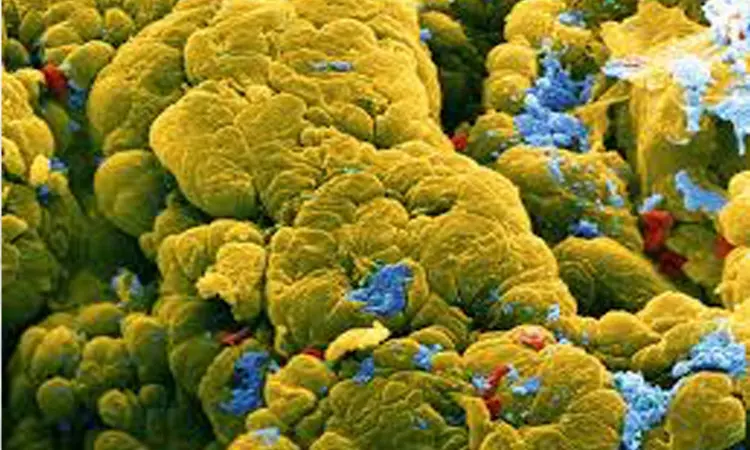- Home
- Medical news & Guidelines
- Anesthesiology
- Cardiology and CTVS
- Critical Care
- Dentistry
- Dermatology
- Diabetes and Endocrinology
- ENT
- Gastroenterology
- Medicine
- Nephrology
- Neurology
- Obstretics-Gynaecology
- Oncology
- Ophthalmology
- Orthopaedics
- Pediatrics-Neonatology
- Psychiatry
- Pulmonology
- Radiology
- Surgery
- Urology
- Laboratory Medicine
- Diet
- Nursing
- Paramedical
- Physiotherapy
- Health news
- Fact Check
- Bone Health Fact Check
- Brain Health Fact Check
- Cancer Related Fact Check
- Child Care Fact Check
- Dental and oral health fact check
- Diabetes and metabolic health fact check
- Diet and Nutrition Fact Check
- Eye and ENT Care Fact Check
- Fitness fact check
- Gut health fact check
- Heart health fact check
- Kidney health fact check
- Medical education fact check
- Men's health fact check
- Respiratory fact check
- Skin and hair care fact check
- Vaccine and Immunization fact check
- Women's health fact check
- AYUSH
- State News
- Andaman and Nicobar Islands
- Andhra Pradesh
- Arunachal Pradesh
- Assam
- Bihar
- Chandigarh
- Chattisgarh
- Dadra and Nagar Haveli
- Daman and Diu
- Delhi
- Goa
- Gujarat
- Haryana
- Himachal Pradesh
- Jammu & Kashmir
- Jharkhand
- Karnataka
- Kerala
- Ladakh
- Lakshadweep
- Madhya Pradesh
- Maharashtra
- Manipur
- Meghalaya
- Mizoram
- Nagaland
- Odisha
- Puducherry
- Punjab
- Rajasthan
- Sikkim
- Tamil Nadu
- Telangana
- Tripura
- Uttar Pradesh
- Uttrakhand
- West Bengal
- Medical Education
- Industry
High BP drugs may reduce risk of colorectal cancer: AHA Journal

DALLAS --Colorectal cancer is the third most common cancer and is the second leading cause of cancer death worldwide.
Researchers have found that medications commonly prescribed to treat high blood pressure may also reduce patients' colorectal cancer risk.ACE inhibitors/angiotensin receptor blocker were associated with a lower colorectal cancer risk in a duration-response manner.The new research has been published in Hypertension, an American Heart Association journal.
This is the first study to show potential benefits on colorectal cancer development from these commonly prescribed hypertension medications, based on a study of more than 185,000 patients.
Angiotensin converting enzyme inhibitor (ACE-i) or angiotensin II receptor blocker (ARB) medications are prescribed for conditions such as heart failure, high blood pressure or heart disease. These medications inhibit or block angiotensin, a chemical that causes arteries to become narrow. Doctors commonly prescribe these medications to people with high blood pressure to relax and open blood vessels, thereby lowering blood pressure.
Based on the findings of this large study, taking these medications may also reduce colorectal cancer risk.
"The roles of ACE inhibitors and ARBs on cancer development are controversial and, in some cases, study findings are conflicting. Results of previous studies have been limited by several factors including a small number of patients and data only on short-term follow-ups. Our results provide new insights on a potential role of these medications for colorectal cancer prevention," said study author Wai K. Leung, M.D., clinical professor of medicine at the University of Hong Kong in Hong Kong, China. "This is the first study to show the potential beneficial effects of ACE inhibitors and ARBs on colorectal cancer development, based on a large group of patients who were colorectal cancer-free at the beginning of the study."
Researchers reviewed health records of 187,897 adult patients in Hong Kong from 2005 to 2013, with a negative baseline colonoscopy for colorectal cancer. The analysis found that:
those who took hypertension medications such as ACE-i or ARBs had a 22% lower risk of developing colorectal cancer in the subsequent three years;
the benefits of ACE-i and ARBs were seen in patients 55 or older and those with a history of colon polyps; and
the benefit associated with the medications was limited to the first three years after the negative baseline colonoscopy.
"While ACE-i and ARBs are taken by patients with high blood pressure, heart failure and kidney diseases, the reduction in colorectal cancer risk may be an additional factor for physicians to consider when choosing anti-hypertensive medications," Leung said.
This is a retrospective study, looking back at whether patients on these medications developed colorectal cancer. Researchers note that the results should be verified with a prospective randomized controlled study, which would actively follow patients to determine the potential benefits of these medications on colorectal cancer risk.
For more details click on the link: http://dx.doi.org/10.1161/HYPERTENSIONAHA.120.15317
Hina Zahid Joined Medical Dialogue in 2017 with a passion to work as a Reporter. She coordinates with various national and international journals and association and covers all the stories related to Medical guidelines, Medical Journals, rare medical surgeries as well as all the updates in the medical field. Email: editorial@medicaldialogues.in. Contact no. 011-43720751
Dr Kamal Kant Kohli-MBBS, DTCD- a chest specialist with more than 30 years of practice and a flair for writing clinical articles, Dr Kamal Kant Kohli joined Medical Dialogues as a Chief Editor of Medical News. Besides writing articles, as an editor, he proofreads and verifies all the medical content published on Medical Dialogues including those coming from journals, studies,medical conferences,guidelines etc. Email: drkohli@medicaldialogues.in. Contact no. 011-43720751


